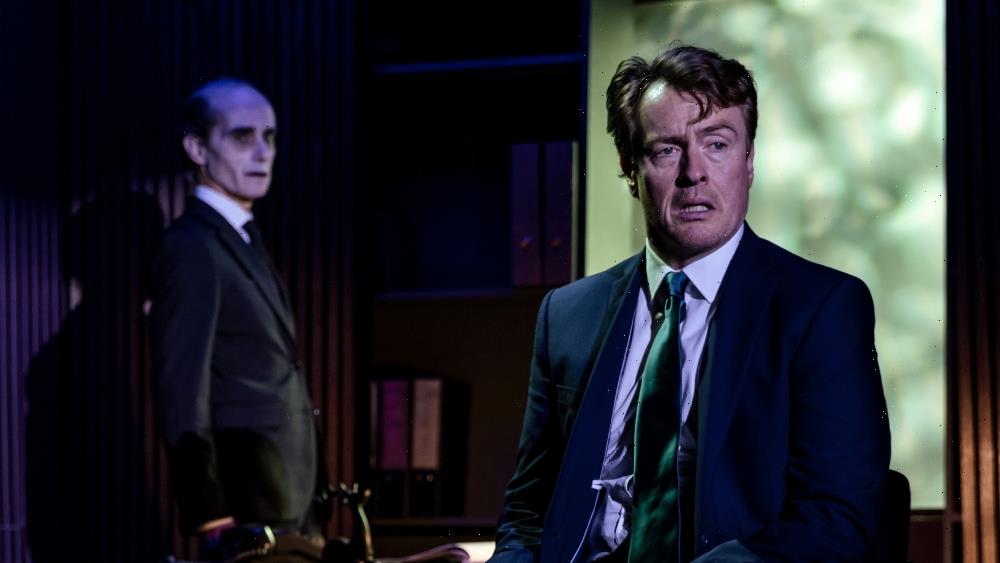The gap between what you see and what you get has long proved fertile territory for playwrights. At his considerable best, not least his Oscar-winning adapted screenplay of his play “The Father,” French dramatist Florian Zeller (and translator Christopher Hampton) has shown that by cunningly changing what audiences are seeing, he can not only define but also dramatize emotional content. Parallel games of physical and mental dislocation are back in his new play, “The Forest.” Alas, it’s a very long way from his best.
Everything starts simply and traditionally with a scene of a father, Pierre (Toby Stephens), returning to his chic home to his elegant wife (Gina McKee) as they attempt to comfort their distraught daughter (Millie Brady), who has just left a husband who has been betraying her for months. As the father promptly attempts to soothe her with palliatives like “Sometimes you have to learn to forgive,” audience suspicions are instantly aroused.
From there the (in)action cuts to a scene staged in a room above, in which an older married man (Paul McGann) is discovered in bed with his younger girlfriend (Angel Coulby). The errant husband? No, as becomes clear, we’re witnessing another incarnation of Stephens’ character. And in the ensuing succession of oblique, increasingly elliptically written exchanges in locations constantly redesigned by Anna Fleischle, those two incarnations embody multiplying possible outcomes to the affair, turning ever harder to handle.
In theory, that’s as eloquent a theatrical device as any with which to depict Pierre’s fraught, increasingly murderous and, crucially, fragmenting state of mind. In practice, however, the situation of upper-middle-class adultery and the writing itself are both so peculiarly generic that the device outstrips all drama.
Constantly reworked variants on dialogue scenes paid huge dividends in Nick Payne’s remarkably fleet-footed “Constellations.” By contrast, Jonathan Kent’s production of “The Forest,” replete with over-emphatic, ominous sound design alerting us to the fact that Something’s Afoot, is surprisingly ponderous.
Stephens works hard to invest Pierre with desperation, but since Zeller has failed to give the character anything original with which to win over the audience, we run out of engaging sympathy frighteningly early. And most of the surrounding characters — unnamed but whose script titles are Male Friend, Man in Black, etc. — are so one-dimensional that the actors merely wind up sounding wearyingly portentous.
The two main female characters, both one-note victims, come off worst of all. McKee is wasted as the wife who worries beautifully and finally gets a single (beautifully held) moment of silence. Meanwhile, Coulby’s increasingly demanding girlfriend gets to play wounded in every sense — think “Fatal Attraction” minus the bunny — but she’s only there to illustrate Pierre’s dilemma.
It’s perfectly valid to examine upper-middle-class adultery via theatrical game-playing, but it’s inescapable that Harold Pinter, Peter Nichols and Tom Stoppard all got there 40 years earlier with far more depth, daring and originality. And none of those demanded attention via cipher-like characters and emptily overplayed metaphors.
Given that a standard plot is beside the point here, it’s no spoiler to reveal that in the succession of closing images, we see the body of a dead stag. This relates to a speech in which Stephens’ character explains a nightmare he has had. Relying upon the recounting of dreams is rarely a strong dramatic move, and when the image only fully resonates when you read the explanatory interview with the writer in the program, it suggests a worrying degree of failure. In a play so busily pointing to dislocations, it’s hard not to recall Gertrude Stein’s observation: “There’s no there there.”
Source: Read Full Article
